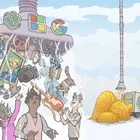Technology companies are falling over themselves to leverage this new and potentially lucrative technology. Google, valued at $1.5 trillion, has gone all in with its Bard chatbot after rival Microsoft, valued at $2.4 trillion, invested billions in San Francisco’s generative AI pioneer OpenAI. Meta, valued at $680 billion, just announced plans to add chatbots to its apps. Venture capitalists are pouring billions of dollars into generative AI startups.
But a thorny, contentious and highly consequential issue has arisen: A great deal of the bots’ fodder is copyrighted property.
The new AI’s intellectual-property problem goes beyond art into movies and television, photography, music, news media and computer coding. Critics worry that major players in tech, by inserting themselves between producers and consumers in commercial marketplaces, will suck out the money and remove financial incentives for producing TV scripts, artworks, books, movies, music, photography, news coverage and innovative software.
 New artificial intelligence: Will Silicon Valley ride again to riches on other people’s products?
New artificial intelligence: Will Silicon Valley ride again to riches on other people’s products?